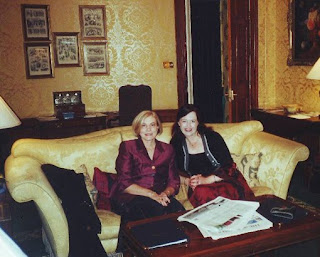Summer Ramblings from the Oregon Shakespeare Festival

As you’ll know if you’ve seen my Twitter updates, I spent the last week in July at the Oregon Shakespeare Festival in Ashland. H0me for more than a week, and I confess a good portion of my brain is still in Messina, River City, the Globe Theater, and assorted other settings from the plays we saw. I blogged about some of plays the last two weeks on my own website, and as the posts touched on story-telling and history, I thought I'd repeat them here.
My good friend, fellow writer, and plotting partner Penny Williamson and I have been going to OSF together for years (that's us above at the Howard in Edinburgh, since I didn't have a scanned picture of us in Ashland). When we're not in the theater on our Ashland trips, we're usually discussing and analyzing the plays over brunch or drinks or dinner or while strolling in and out of shops. Over dinner the last night of our trip, we found ourselves discussing the heroes of two of the plays we'd seen and the transformations they undergo.
Benedick begins Much Ado About Nothing tossing off clever repartee and exchanging witty insults with Beatrice. Then, in the midst of the play, after Benedick has been tricked into admitting his love for Beatrice and she hers for him, the story takes a dark turn. Beatrice’s cousin Hero is falsely accused of infidelity on her wedding day. Benedick’s friends, Claudio (Hero’s fiancé) and Don Pedro, believe the story without question, turning Hero and Claudio’s wedding into tragedy. Even Hero’s father condemns her at first. Of the major male characters, only Benedick questions the truth of what has happened. Eventually, he trusts Beatrice’s faith in Hero’s innocence enough that he challenges Claudio to a duel and discontinues his service to Don Pedro. When Claudio and Don Pedro try to joke with him later in the play, it’s Benedick who reminds them of the gravity of the situation. Benedick shows his mettle and the strength of his commitment in the second half of the play. In the end, when he and Beatrice—still bantering—are betrothed, you truly believe the marriage will work.
Harold Hill in The Music Man also undergoes a transformation. He begins to woo librarian Marian Paroo under the mistaken impression that she’s a “sadder’ but wiser girl,” planning to skip town before the residents of River City can discover that he’s incapable of leading the boys’ band he’s sold them on. But even as Harold transforms starchy River City (wonderful evoked on the OSF production by the costumes changing from shades of gray to vibrant color), he is also transformed. When he realizes Marian has fallen in love with him, knowing full well that he is an impostor, he becomes the man she believes him to be. Watching the OSF production, I was struck by the amazing emotional shifts Harold undergoes in the latter part of the story. From realizing Marian loves him but thinking she’ll hate him when she knows the truth, to his wonder at the revelation she loves him for who he really is, to his realization that with this he loves her and can’t run. In the end Harold stays in River City to face the music (which at that point looks as though it will be decidedly unpleasant), a moment beautifully captured in the this production when Harold holds out his hands to be handcuffed. And then there’s his stunned amazement when Marian hands him a baton to lead the boys—and girls in the OSF production—band, and the young musicians manage to scrape together enough notes to delight their parents.
Benedick’s and Harold’s emotional arcs were brilliantly catpured in the OSF productions by David E. Kelly (as Benedick) and Michael Ellich (as Harold). The audience saw both men grow and change over the course of the plays, and that growth made the endings to both plays ring with heart-warming truth.
Another highlight of our trip was the world premiere production of a fabulous new play called Equivocation by Bill Cain. I mentioned Equivocation last week in the comments following Lauren's great post on authors as characters in fiction.
Equivocation begins with James I’s minister, Robert Cecil, demanding that Shakespeare write a play about the Guy Fawkes plot, adding almost apologetically “The King wants witches.” Shakespeare, called Shagspeare or Shag in the play, is torn, seeing the impossibility and dangers of writing the play, seeing also the risks of refusing. The members of the Globe Theater company are torn as well, but in the end agree he should take the commission. Then Shag begins to investigate the Gunpowder Plot and to question if the official version of events is really the truth.
In addition to the actor who plays Shag, four actors play members of the Globe company and also play Cecil, James I, the conspirators, and various other characters. The one other actor plays Shag’s daughter Judith, with whom he has a fraught relationship owing to the death of her twin brother and the fact that, in his words, “We both know I wish she was the one who had died.”
Equivocation is a brilliant play on a number of levels. It’s exciting storytelling as Shag attempts to unravel the truth behind the Gunpowder Plot. There are fascinating philosophical layers about power, forgiveness, the nature of truth, the nature of theater. Much of the dialogue is laugh-out-loud funny, but there are also moments that make you gasp at the tension, and the end had me in tears. One thing that struck me in terms of Lauren’s blog is that the portrait of Shakespeare really seems like the man who might have written Shakespeare’s plays and that he thinks and talks like a writer. (I felt the same about the Shakespeare in Shakespeare in Love).
The actor characters in Equivocation also ring true. There’s a wonderful scene early on in Equivocation where they’re rehearsing King Lear and complaining it doesn’t make any sense (everyone’s mad or pretending to be mad and no one’s listening to anyone else). Richard Burbage says “if we got through his comedies-don’t-have-to-be-funny period, we can get through whatever this is.” ![]() .
.
A sampling of some other favorite lines:
Robert Cecil: “What’s the word for a person who waits till the last minute? A…”
Shag: “Writer?”
Judith: “Lear’s about an old man who causes the death of his three daughters and, when it’s over, everyone feels sorry for him.”
Shag: “He [Cecil] insulted me. He said my work would last fifty years.”
Shag [to one of the young actors]: “Anyone who has the looks, energy, needs approval as much as you do and doesn’t care about anyone but himself–can be a great actor. A rare combination, but you have it.”
The actors in Equivocation (Anthony Heald, Richard Elmore, Jonathon Haugen, John Tufts, Gregory Linington, and Christine Albright) did a fabulous job of bringing this complicated story to life (Equivocation, like The Music Man, was directed by OSF's new artistic director Bill Rauch). Even though of course you knew most of them were playing multiple parts, the characters seemed so distinct that it was almost startling in the curtain call to remember there were only six of them. There were many moments in Equivocation and other plays we saw when I wished I could find the words as a novelist to capture the emotions being so eloquently brought to life on stage.
Going back to my comments on Benedick and Harold Hill, do you have favorite characters, in plays or books or movies, who change and earn a hard-won happy ending? What makes the change particularly believable?
Do you have favorite plays or books or movies that depict writers and/or actors? What makes them work?
Writers, do you find theater inspiring?



Comments
Post a Comment